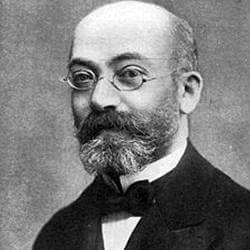July 26 is Esperanto Day

Dr. L.L. Zamenhof
Today is Esperanto Day. On July 26, 1887, Dr. L.L. Zamenhof published Dr. Esperanto’s Lingvo Internacia (International Language), also known as Unua Libro (First Book), a textbook about the new language he’d just invented.
Zamenhof didn’t create Esperanto as an intellectual exercise. It was his practical solution to an issue dividing people and cultures. He created a common language that would enable everyone to communicate freely, without the need for translation or governmental manipulation.
Esperanto is comparatively easy to learn due to its logical construction. It employs phonetic spelling and 16 basic rules of grammar that have no exceptions, thereby eliminating the frustration familiar to students of any other language. Because it uses the roots of European languages, mastering Esperanto as a second language can make it easier to learn a third.
Zamenhof wrote, “An international language, like a national one, is common property.” He renounced his rights and placed his work in the public domain. He used the pen name “Doktoro Esperanto” (Doctor One-Who-Hopes). Students began to call it “Esperanto,” and the name stuck.
Today, approximately two million people speak Esperanto, and there are numerous magazines, books, clubs, and pen-pal programs devoted to it. Community members often seek each other out when traveling. Esperantists make friends around the world.
Dr. Zamenhof would be proud.
Fun fact:
In 1966, William Shatner starred in Inkubo (Incubus), the first and only film entirely shot in Esperanto. In his autobiography, Shatner wrote that he simply memorized his lines and never saw the completed film because he doesn’t watch his own performances. He joked in the book that he certainly wasn’t going to break that self-imposed rule to watch himself trying to speak Esperanto. (If you care to watch this scene, we think you’ll agree that he made the right decision.)
Shatner was cast in Star Trek soon after and never had a need to learn the language. Some Esperantists who’ve seen the horror film say his diction was off, and at times, the actors appeared to be reading from off-camera cue cards. We’re not sure how Dr. Zamenhof would feel about that.
Happy Esperanto Day!
© 2025, Worldwide Weird Holidays. All rights reserved.









Leave a Reply
Want to join the discussion?Feel free to contribute!